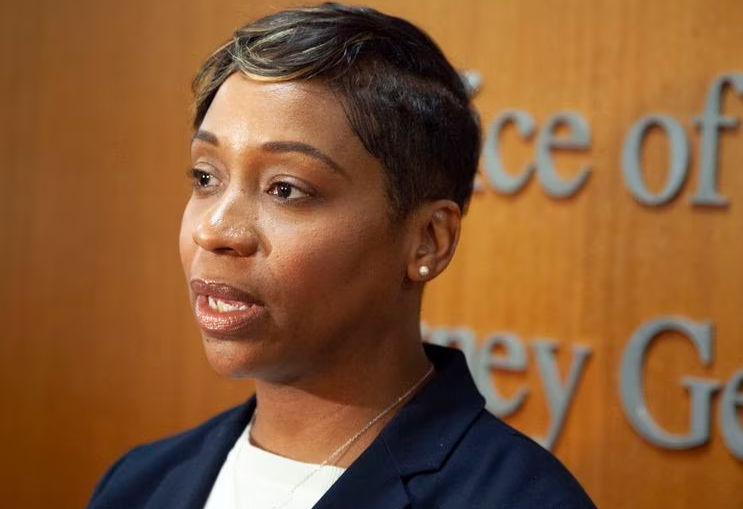As tens of thousands of borrowers across the commonwealth prepare to resume making payments on their student loans the next week, the Attorney General of Massachusetts, Andrea Campbell, has joined the ranks of other authorities from the Bay State who are calling on Washington to be alert.
On Friday, Attorney General Campbell joined with 18 of her colleagues from other states to write a letter to the White House and the United States Department of Education. The letter expressed more concerns regarding the ability of loan servicers to fulfil rising demand and urged additional protections for students.
According to a statement released by Campbell, “borrowers of federal loans will face a multitude of challenges as they begin making payments the following month.” Among these challenges is the possibility that borrowers will have trouble communicating with the loan servicers that manage their loans. “We are concerned that these challenges may prevent borrowers from accessing more affordable payments, including those that are available under the new SAVE repayment plan.”
According to a story that was made public by MassLive in the past, Senators Warren and Markey, together with Democratic U.S. Senators Richard Blumenthal of Connecticut and Chris Van Hollen of Maryland, stated in that letter that they were “deeply worried” about the readiness of the corporations.
After a prolonged halt of more than three years, more than 40 million borrowers throughout the country, including nearly 1 million in the state of Massachusetts, are getting ready to resume making their payments. In the beginning of this month, interest started piling up once more on those debts.
The vast majority of loans were moved to new servicers, and those new servicers have stated that they are doing everything in their power to facilitate a seamless transition.
“Collectively we have done our best to project the inbound call volumes, staffing needs, back-office processing volumes, and other components that will allow our borrowers to receive assistance and customer service they deserve despite the unprecedented nature of the lengthy repayment pause,” EdFinancial Services CEO William Anthony ‘Tony’ Hollin wrote in a letter dated August 1 to Warren and Markey. Hollin is one of those loan servicers.
Campbell and Bob Ferguson, who is the attorney general of Washington state, were co-leaders of the letter. They were joined by the solicitors general of the following states and the District of Columbia: Arizona, California, Colorado, Connecticut, Delaware, Hawaii, Illinois, Maryland, Michigan, Minnesota, Nevada, New York, Oregon, Pennsylvania, Vermont, and Wisconsin.
This week, Campbell and her colleagues called for a more enthusiastic approach to federal oversight, noting that “amidst a significant student debt crisis, which disproportionately affects low-income borrowers, women, and people of colour, it is critical that the Biden Administration take further action to avoid harm to borrowers.”
The latter makes a reference to a repayment programme that is currently being made available to borrowers that is driven by the borrower’s income.
The action that Campbell and her colleagues took comes just a few days after senators Elizabeth Warren and Ed Markey of Massachusetts, together with several of their fellow Democrats, wrote a letter to the top four loan servicers, asking for an update on the same matter that Campbell and her colleagues are now investigating.
Although the SAVE programme and the Public Service Loan Forgiveness Programme (for qualifying borrowers) are both good first steps, Campbell and her colleagues cautioned that the likelihood of loan servicing issues appears to be high. This is especially true given that the Education Department “appears to lack the capacity to assist borrowers, oversee servicers, and enforce borrower protections during the return to repayment.”
The letter arrives at a time when there is also the possibility of an impending government shutdown, during which the capabilities of the federal government to exercise oversight are likely to be severely hampered.
Ayanna Pressley, a Democrat representing Massachusetts’s 7th Congressional District in the United States House of Representatives, argued on Wednesday that requiring borrowers to make payments during a possible closure of the federal government would be “a recipe for disaster.” She called on the federal government to suspend repayments during the potential shutdown.
Pressley stated in a statement that “this Republican government shutdown stands to harm families across the nation.” Many of these families had just begun to restore their financial footing for the first time since the COVID-19 catastrophe. “This Republican government shutdown stands to harm families across the nation.” In light of these harsh facts, the administration of Vice President Joe Biden ought to definitely put a halt to both the repayment of student loans and the accumulation of interest.
According to data compiled by the Institute for College Access and Success for the academic year 2019-2020, 56% of college graduates in the state of Massachusetts have some kind of student debt, with an average balance of $33,457. That was good for the eighth-highest total throughout the country.
According to a statement released by the institute, approximately one-third of those students, or 31%, had debt that was not owed to the federal government. Non-federal debt is typically more expensive and contains fewer consumer safeguards than federal debt.
The most important factor was participation in the private student loan market, which was dominated by banks and other private lenders. According to the data provided by the institute, approximately 14% of the students in the commonwealth had such debt, with an average debt amount of $42,748.





